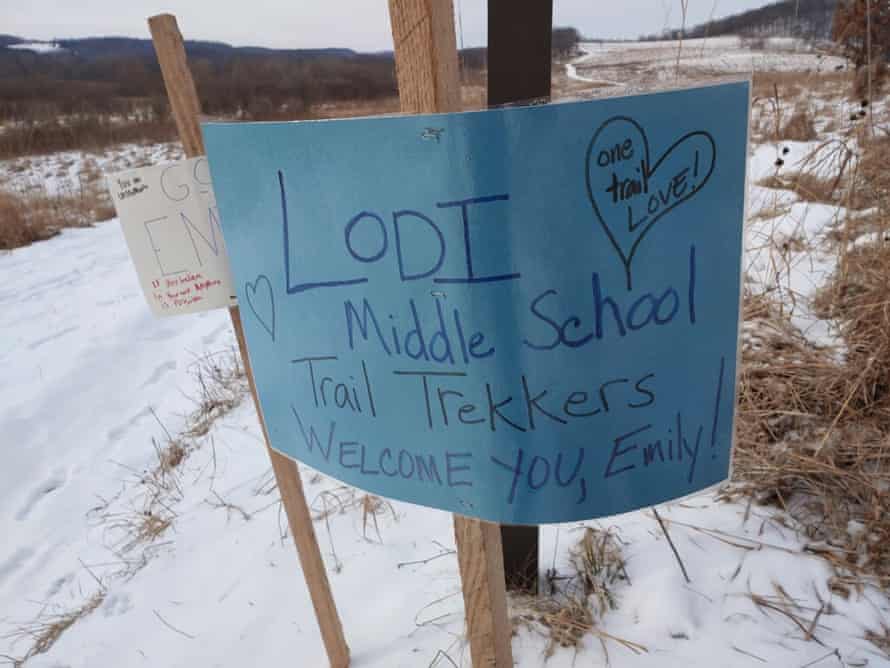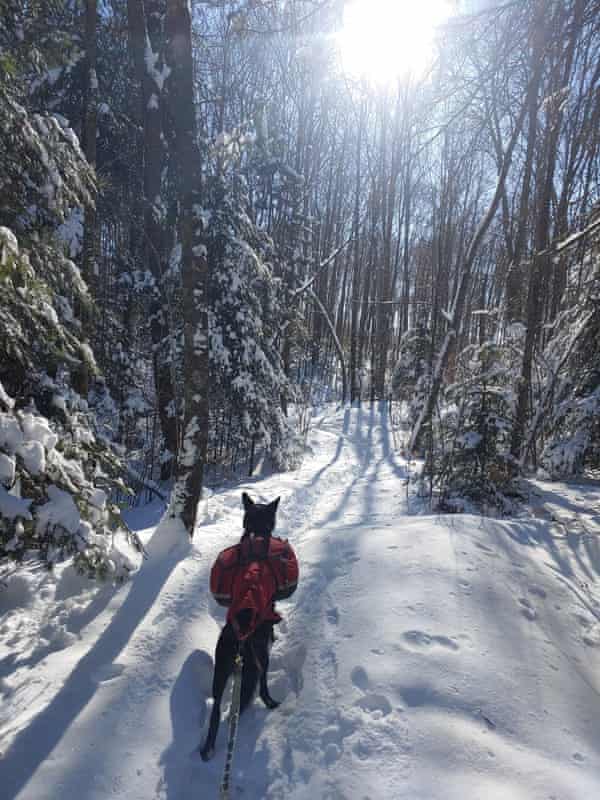Trekking across 1,200-miles of Wisconsin forests and prairies carrying a 65lb pack in temperatures as low as -37F was initially meant as a passion trip for Emily Ford, during her off season as a professional gardener.
The 28-year-old ended up taking along thousands of online fans on her journey across the Ice Age national scenic trail, helping to further shift the narrative about who belongs in these outdoor spaces. And on Saturday, when she took her final steps across the frigid expanse with a crowd of supporters there to celebrate, she became the first Black woman known to have thru-hiked the trail.
Race was a common subject of conversation with people she met on the trip. She also encountered incredible support in the form of “trail magic”. People left snacks, such as homemade muffins and a pancake sandwich, as well as treats for her Alaskan husky, Diggins, at trailheads. The food came with notes telling her what her trip meant to them and encouraging her forward.
“I hope that this kind of breaks down the stereotype for a lot of people,” she said, “whatever color they are”.

Ford has loved the outdoors since she was a kid, gardening with her mom and helping out on her grandparents’ farm. That passion was reinforced when she went camping as part of her geology degree in college, and again five years ago, when she took her first backpacking trip: a 30-mile portion of the Superior hiking trail in Minnesota.
Last fall, as Ford was planning her latest adventure, the nation was grappling with the death of George Floyd at the hands of a white police officer in her home state of Minnesota. As the Black Lives Matter movement gained prominence, she said, she wondered how she could contribute to the equality movement.
That’s when things just seemed to click, and Ford decided the trip would “be for all of us who don’t quite feel safe on the trails”, whether “we’re people of color, or you feel like an outsider in outdoor sports, or you just don’t see people that look like yourself doing these sports”.
Diversity and inclusion in US outdoor spaces have been lacking. The Outdoor Foundation’s 2020 report on outdoor participation found that although Black Americans represented about 12% of the US population in 2019, they made up 9.4% of outdoor participants.
“Lots of times we like to say, ‘Oh, the outdoors can’t be racist,'” said Chaya Harris, national program director of Outdoor Afro, a non-profit that works to connect Black people to nature. “But when you think about the outdoors, it’s a culture, and that culture doesn’t represent everybody; it doesn’t include everybody.”

Often outdoors stories center on “the traditional narrative of the privileged white man”, Harris said. But she’s noticed that as more stories like Ford’s are circulated across social media and beyond, the landscape is shifting.
“People are able to share more about their experiences and show what they’re doing,” she said. “We’re able to see ourselves more and know that ‘hey, I belong in that space, too.'”
During Ford’s 10-week journey, she said she never felt unsafe. But the subject of race was frequently raised by white people, such as by a man whose family was giving her shelter overnight, and who informed her that his “kids don’t see color”.
“You can see that they are trying to be the good person of the world and do no wrong because you don’t want to be the bad guy, especially with having a Black person stay at your house,” Ford said. “But what you hear in that situation is like you’re uneducated on this topic, and instead of asking questions, you’re assuming of what you should say.”
When Ford kicked off her journey in late December, she had only 200 Instagram followers. But as news about the trek spread and she started posting weekly updates about the experience, excitement grew and the number has ballooned to over 9,200.
Teachers told her that their students were tracking her hike, and in Cornell, Wisconsin, she visited a classroom of fourth graders to describe the experience. Parents of kids of color sent messages thanking her for “showing my kid that they can achieve their dreams”.
The final week of the trek was as special, and arduous, as the others. On Monday, Ford had been hiking through deep, crusty snow, with winds raging, and she needed a short break somewhere warm. That’s when, despite seemingly being in the middle of nowhere, she spotted a sign pointing her to a pottery shop, just 200 yards away. The owner let her come in to warm up, and they ended up talking for two hours.
On Wednesday night, speaking from her tent with owls hooting overhead, she reflected on being just days away from completing the trail. She said she wanted her trip to help break down barriers for people of color in outdoor spaces, or, really, any situation.
“I’m hopeful that it’s helpful to folks who even have dreams or goals that have nothing to do with backpacking at all, but they saw this 28-year-old do this ridiculous trip in the wintertime, and now they have this fire to tackle the hard things in their life.”